Filter by
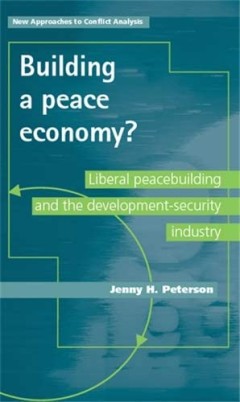
Building a Peace Economy? : Liberal peacebuilding and the development-securit…
This book critically examines the range of policies and programmes that attempt to manage economic activity that contributes to political violence. It offers a new framework for understanding both the problem of economic activity in conflict zones as well as programmes aimed at managing these and transforming them into more peaceful economic and political relationships. Through this examination…
- Edition
- -
- ISBN/ISSN
- 9781526129376
- Collation
- 219p : ill
- Series Title
- -
- Call Number
- 303.66 JEN b
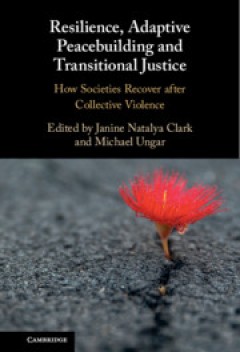
Resilience, Adaptive Peacebuilding and Transitional Justice How Societies Re…
Processes of post-war reconstruction, peacebuilding and reconciliation are partly about fostering stability and adaptive capacity across different social systems. Nevertheless, these processes have seldom been expressly discussed within a resilience framework. Similarly, although the goals of transitional justice – among them (re)establishing the rule of law, delivering justice and aiding rec…
- Edition
- -
- ISBN/ISSN
- 9781108919500
- Collation
- xvii, 310 p ; ill
- Series Title
- -
- Call Number
- 155.232 RES J
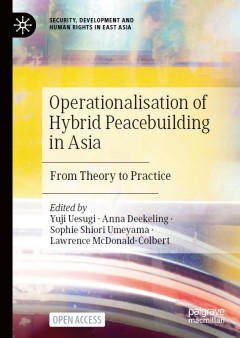
Operationalisation of hybrid peacebuilding in Asia : from theory to practice
This open access book explores common critiques in the literature of hybrid peacebuilding, especially the lack of connection between hybridity in theory and practice. Through using a complexity-informed framework, the foundation for introducing the mid-space actor typology is established. Mid-space actors as insider-partial mediators are perceived to be vital agents for peace processes in confl…
- Edition
- -
- ISBN/ISSN
- 9783030677589
- Collation
- xix, 203p. : ill.
- Series Title
- -
- Call Number
- 327.17209596 OPE o

The state of peacebuilding in Africa : lessons learned for policymakers and p…
This open access book on the state of peacebuilding in Africa brings together the work of distinguished scholars, practitioners, and decision makers to reflect on key experiences and lessons learned in peacebuilding in Africa over the past half century. The core themes addressed by the contributors include conflict prevention, mediation, and management; post-conflict reconstruction, justice and…
- Edition
- -
- ISBN/ISSN
- 9783030466350
- Collation
- xix, 431 p.; ill
- Series Title
- -
- Call Number
- 327.172096 THE t
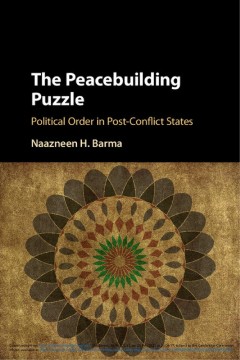
The peacebuilding puzzle : political order in post-conflict states
Transformative peace operations fall short of achieving the modern political order sought in post-conflict countries because the interventions themselves empower post-conflict elites intent on forging a neopatrimonial political order. The Peacebuilding Puzzle explains the disconnect between the formal institutional engineering undertaken by international interventions, and the governance outcom…
- Edition
- -
- ISBN/ISSN
- 9781316718513
- Collation
- xiv, 265p. : ill.
- Series Title
- -
- Call Number
- 355.357 BAR p
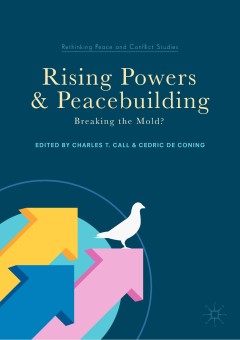
Rising powers and peacebuilding : breaking the mold?
This edited volume examines the policies and practices of rising powers on peacebuilding. It analyzes how and why their approaches differ from those of traditional donors and multilateral institutions. The policies of the rising powers towards peacebuilding may significantly influence how the UN and others undertake peacebuilding in the future. This book is an invaluable resource for practition…
- Edition
- -
- ISBN/ISSN
- 9783319606217
- Collation
- xv, 276p. : ill.
- Series Title
- -
- Call Number
- 327.172 RIS r
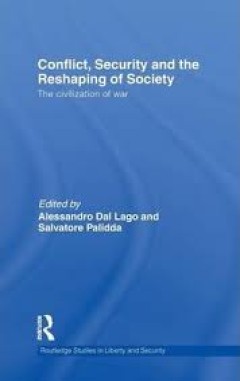
Conflict, security and the reshaping of society: the civilization of war
This book is an examination of the effect of contemporary wars (such as the 'War on Terror') on civil life at a global level. Contemporary literature on war is mainly devoted to recent changes in the theory and practice of warfare, particular those in which terrorists or insurgents are involved (for example, the 'revolution in military affairs', 'small wars', and so on). On the other hand, toda…
- Edition
- -
- ISBN/ISSN
- 9780415570343 (hardcover)
- Collation
- ix, 227 p. ; 24 cm.
- Series Title
- Routledge studies in liberty and security
- Call Number
- 303.66 DAL c
 Computer Science, Information & General Works
Computer Science, Information & General Works  Philosophy & Psychology
Philosophy & Psychology  Religion
Religion  Social Sciences
Social Sciences  Language
Language  Pure Science
Pure Science  Applied Sciences
Applied Sciences  Art & Recreation
Art & Recreation  Literature
Literature  History & Geography
History & Geography